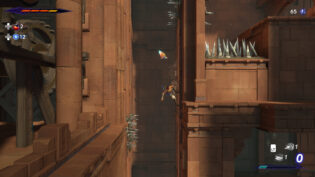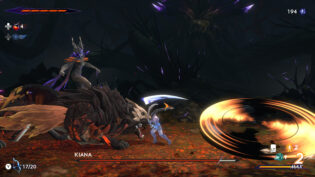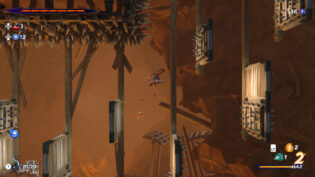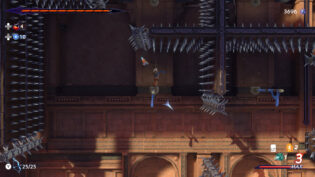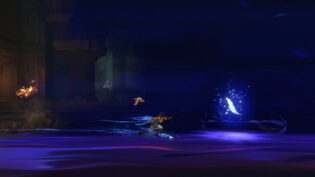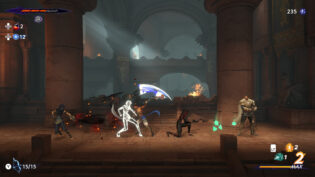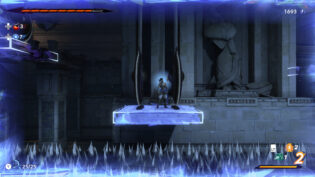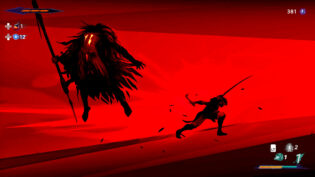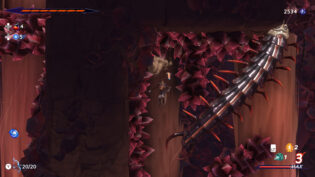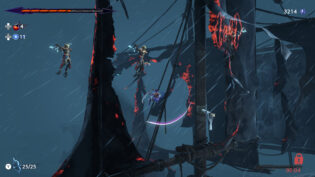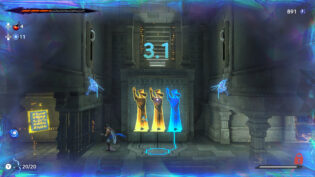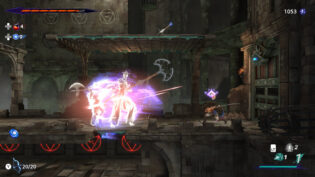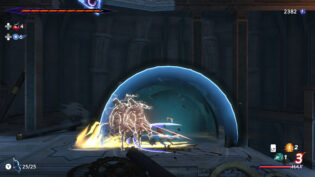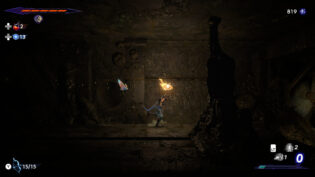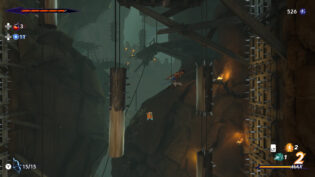I’ve been interested in the Prince of Persia series since experiencing the original game as a kid. And it’s hard to downplay the its influence on platforming games, both in 2D and 3D. The original (that hopefully may get the “The Making of Karateka” treatment someday, along with the sequel) established the methodical and precarious cinematic platforming that shaped the early platforming focused 3D action adventure games, most notably Tomb Raider. While Sands of Time established a new standard for 3D action adventuring, that can still be felt even in the recent releases. But the current rights holder of the series, Ubisoft, haven’t made any new Prince of Persia games for over a decade, with the last release being The Forgotten Sands in 2010 (a ironically titled game that is quite good, but, indeed, often forgotten). Instead, they focused on the franchise that began its life as a next Prince of Persia game – Assassin’s Creed.
Or at least they did until 2023, when Prince of Persia: The Lost Crown was announced. A completely new game that is going back to 2D platforming, but this time with a metroidvania-style world design, like in Warrior Within and PoP 2008. I was very excited about it, waited out the half a year of timed exclusivity on PC for EGS and… This was one of the most miserable experiences I’ve had in a while. And if not for the Prince of Persia title, I would’ve stopped playing pretty early on. That said, I won’t be surprised if there will be people with a mostly opposite experience to mine. A difference that will boil down to a simple question – do you like precision platformers?
I want to address this question first, because it will be the deciding factor for most players. For context, I like metroidvania games for exploration. I’m fine with some fun challenge and tough platforming and occasional tough combat, but I play them for exciting locations I get to explore using fun traversal mechanics (which can be limited and simple as long as they feel fun). I don’t like precision platformers and don’t like when a metroidvania game focuses on combat or makes it too complicated. For example, Blasphemous (and especially Blasphemous 2), Axiom Verge (and 2) or La-Mulana 2 were games that I liked a lot, even though they got frustrating occasionally. Metroid: Samus Returns was something that I’ve forced myself to finish. While Celeste, Environmental Station Alpha or Hollow Knight were games that I never finished. I respect what they do, but get no enjoyment out of playing them. Prince of Persia: The Lost Crown is trying to copy the latter named titles, which is already not great for me, but on top of that – it’s not even doing a very good job.
So what does it do? This game plays as a 2D hack and slash precision platformer where you explore the interconnected world to gather helpful items and gain new abilities. When you encounter enemies, the game tries to play like a modern Souls-inspired title, where mistakes are costly and healing is done via a limited use item that gets refilled when you rest at checkpoints, but doing so also respawns all enemies. The combat system itself is complicated, with lots of Devil May Cry-like moves and air juggling. While most of the traversal ability upgrades also improve your combat capabilities. Dying loses you some currency, but thankfully the game is using the Axiom Verge logic, so you don’t lose any of your map, item, ability or puzzle solving progress, unless the latter are designed to be timed and have to be redone every time you are in the room.
When not in combat, the game varies between simple platforming and precision platforming rooms, where one mistake resets you back to the beginning of the course. These range from somewhat tough, to basically impossible to do on the first try as they rely on memorization, rather than reaction. Some of these are optional and contain collectibles and upgrades, but most of the abilities you gain in the game don’t make these rooms easier to do, even if you do them very late in the game, due to how specific their design is. A lot of the optional challenges were clearly based on Celeste, to the point where one of the collectible types in the game even behaves exactly like strawberries in said game.
This precision platforming alone is already not my cup of tea and if The Lost Crown promoted itself as clearly as The Rogue Prince of Persia does (I’m not a fan of roguelite anything), I would’ve completely skipped this title. But I also feel like neither combat, nor precision platforming are done that well. The combat suffers from the issues that are becoming very common in modern action games – in them trying too hard to “make a balanced game” they’ve created something that feels very sterile and reliant on “hard counters” to enemy types and enemy moves, instead of flowing freely like what you’d see in a DMC game. But it has lots of moves and inputs, which contaminates the precision platforming aspect of the title, making it feel more complicated than it should be. In Celeste you can easily remember your movement capabilities and focus on making them more optimized and fun. In Prince of Persia: The Lost Crown you’re always at a risk of forgetting which button does what or accidentally triggering a move that might help in a fight, but in a room full of spikes it can only kill you.
Plus that memorization focus?.. I don’t get it. There’s one (thankfully optional) room in the game, where you have to simply avoid traps coming at you from different directions for over 2 minutes. One hit and you must restart the entire sequence. Which, as mentioned, is based around memorization, not reaction. It’s just one room, but it also shows the general design philosophy for the “platforming challenge” of the entire game. You’re punished for not knowing what comes next. And when you know what comes next, it’s boring execution, as the basic movement in this game isn’t that fun. I don’t get how this can be fun.
There are technical issues as well. I have not encountered anything permanently game breaking, but I did get several gates permanently stuck closed a few times until the game was reloaded. In-game map sometimes may mark things in an incorrect state as well. Characters could appear in some spots and do nothing, because they’re waiting for a cutscene that has already happened before. I’ve died a few times due to weird physics and collision issues. What constitutes as damage zones on the insta-reset spots can be inconsistent and visually not clear. And the way the game handles cloud saving is outright bizarre and unlike what Ubisoft usually does.
Of course, there are some nice things. The visual style of the game is very cool. Some aspects of the story are interesting, especially the setting itself and the focus on Persian mythology… Though the storytelling itself is quite poor, to the point where one of the key characters is just removed from the story at one point. Which is either a sign of development cuts, as Ubisoft no longer see this franchise as important. Or the story was intentionally cut to have space for the DLC that has been teased recently.
I didn’t hate every minute with the game. There are solid puzzles and some fun platforming occasionally. Some cool locations and sometimes interesting exploration. Even combat is, at times, almost fun. And because of that, or the fact that there are people who love this sort of precision platforming, I can see an audience for Prince of Persia: The Lost Crown. Heck, major game critics seemed to like the game a lot. But not me and I would like to never play this game again.


